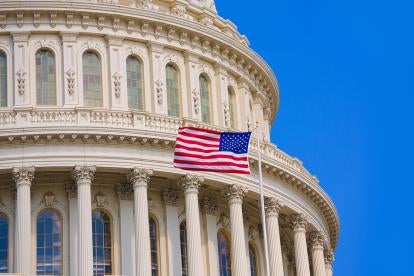Legislative Activity
House to Vote on Financial Services Appropriations Bill as Hensarling Pushes Plan to Replace Dodd-Frank
This week, the House is expected to consider the FY 2017 Financial Services and General Government Appropriations Act, which passed out of Committee largely along partisan lines and contains various provisions that would peel back certain aspects of the Dodd-Frank Wall Street Reform and Consumer Protection Act (Dodd-Frank). The Senate, however, last week passed a much more bipartisan counterpart bill that contained very few controversial provisions and would leave current financial services policy largely intact.
The divergence between House and Senate Appropriators can also be seen in the two Committees with jurisdiction over financial services issues. In the House, Financial Services Committee Chairman Jeb Hensarling (R-TX) recently unveiled details about the Creating Hope and Opportunity for Investors, Consumers, and Entrepreneurs (the CHOICE Act), which is the Republican plan to replace the Dodd-Frank Act. While the House is unlikely to take up his broad package, the body has passed numerous tweaks to the nation’s banking laws this year. The Senate, however, continues to show little interest in moving financial services bills this Congress, thus pushing any significant reforms until at least 2017.
Lawmakers Set to Receive Report on Monetary Policy, Terrorism Financing
This week, Janet Yellen, Chair of the Board of Governors of the Federal Reserve System, will appear before Congress to testify on U.S. monetary policy and the state of the economy. The hearing will serve as an opportunity for Members of Congress to highlight continued concerns over current monetary policy activity at the Federal Reserve. Note that last week, the Federal Reserve announced that it would not raise its benchmark interest rate, suggesting that future increases are now expected to occur at a slower pace than originally anticipated.
Additionally, in the wake of the Orlando terror attack, the House Financial Services Task Force to Investigate Terrorism Financing will meet this week and summarize its two-year survey of current efforts to combat terrorist financing and related forms of illicit finance. As the Task Force concludes its work, lawmakers will now focus on finalizing its report and recommendations regarding what needs to be done to update the nation’s banking laws to better prevent the financing of terrorist activity. Though exactly what those recommendations will be are unclear, much of the focus thus far has been on examining beneficial ownership regulations, “know your customer laws,” and the need for better coordination within and between governments.
Will PROMESA Keep Its Promise for Puerto Rico?
Senate Majority Leader Mitch McConnell (R-KY) has indicated that he plans to bring H.R. 5278, the Puerto Rico Oversight, Management, and Economic Stability Act (PROMESA), up for consideration before the end of the month; the Commonwealth faces a $2 billion bond payment – which it will be unable to make – on July 1. Presently, it is unclear whether the Senate will allow amendments to the bill, which is aimed at resolving Puerto Rico’s fiscal crisis. Still, various Senators, leg in large part by Senator Robert Menendez (D-NJ), have been vocal about the need to include stronger economic and tax incentives and hope to use the amendment process to include such provisions in the final bill. However, given that the House is expected to recess at the end of this week, allowing amendments at this point will almost certainly push final passage beyond the July 1 deadline, potentially having devastating consequences for Puerto Rico and the bond markets generally. For his part, Treasury Secretary Jack Lew is urging the Senate to pass the Puerto Rico bill expeditiously and address any remaining concerns at a later date.
This Week’s Hearings:
-
Tuesday, June 21: The Senate Banking, Housing and Urban Affairs Committee will hold a hearing titled “The Semiannual Monetary Report to Congress.”
-
Tuesday, June 21: The Senate Health, Education, Labor, and Pensions Subcommittee on Primary Health and Retirement Security will hold a hearing titled “Small Business Retirement Pooling: Examining Open Multiple Employer Plans.”
-
Wednesday, June 22: The House Financial Services Committee will hold a hearing titled “Monetary Policy and the State of the Economy.”
-
Thursday, June 23: The House Financial Services Committee Task Force to Investigate Terrorism Financing will hold a hearing titled “The Next Terrorist Financiers: Stopping Them Before They Start.”
-
Thursday, June 23: The Senate Banking, Housing, and Urban Affairs will hold a hearing titled “Bank Capital and Liquidity Regulation Part II: Industry Perspectives.”
Regulatory Activity
House Democrats Push Back Against Payday Lending as Efforts to Delay the Rule Under Way
Last week, Democrats on the House Financial Services Committee released a report focused on how certain short-term, small dollar lenders allegedly “exploit loopholes” in various states’ (Ohio, Texas, Florida, California, and Colorado) regulatory regimes to get around various lending restrictions. The report urges the Consumer Financial Protection Bureau (CFPB) to issue a final short-term, small dollar loan rule that is broad enough to cover any attempts to evade it, including attempts by online and tribal lenders to issue loans in states where payday lending is banned.
Since proposing its rules on payday, vehicle title, and certain high-cost installment loans, the CFPB has been proceeding expeditiously to finalize its proposal. Comments are expected to be due in mid-September, with the Bureau likely to finalize the rulemaking shortly thereafter, despite significant concerns from industry about the potential impact on consumer access to credit. Notably, in passing its FY 2017 Financial Services and General Government Appropriations Bill, the House Appropriations Committee adopted a “stop and study” amendment, which would delay the rulemaking and require an impact study before the Bureau is permitted to finalize the rulemaking; the Senate bill did not include such a provision. The CHOICE Act (mentioned above), would also permit States and tribes to request an unconditional five-year waiver from the rulemaking.
SEC Slow to Move on Fiduciary Rule, Addresses Other Priorities
Last week, Securities and Exchange Commission (SEC) Chair Mary Joe White confirmed before the Senate Banking Committee that the SEC is unlikely to propose a uniform fiduciary standard of conduct for broker-dealers and investment advisors providing personalized investment advice about securities to retail customers until next year. According to Chair White, the SEC intends to observe the consequences and reactions to the Department of Labor’s Fiduciary Rule to gauge if a “conflict develops.” Chair White has also indicated there may be some divergences between the SEC’s proposal and DOL’s rule, though she did recognize the need for a uniform fiduciary rule for broker-dealers and investment advisers. Relatedly, note that this week, the House will take up and consider the President’s veto of a Congressional Resolution seeking to block DOL’s proposal.
In addition to discussing the SEC’s work on its Fiduciary Rule with members of the Senate Banking Committee, Chair White also addressed a myriad of the Commission’s upcoming priorities, including disclosures and corporate political spending, as well as the need for additional resources.
CFTC Re-Opens Comment Period on Reg AT
On June 10, the Commodity Futures Trading Commission (CFTC) held a staff roundtable on elements of Regulation Automated Trading (Reg AT), which is designed to address various issues relating to algorithmic trading on Designated Contract Markets (DCMs). The CFTC proposed Reg AT in December 2015 and provided for a 90-day comment period. During the Roundtable, discussion focused on three main issues: (1) registration requirements for DCMs, including requirements covering pre- and post-trade risk controls; (2) development, testing, and monitoring of systems; and (3) record-keeping, reporting, and personnel training requirements. Industry panelists, including many representatives from high-frequency trading firms and other financial services firms, cautioned against further regulations that may burden such firms with onerous reporting and record-keeping requirements.
To consider these concerns, the CFTC has reopened the comment period through this Friday, June 24. Notably, this action by the CFTC comes as the SEC last week granted regulatory approval to IEX Group Inc., a new stock exchange that slows the speed of trading.
The CFTC has also recently to expand Regulation 50.4(a) to require more interest rate swaps to be cleared either through a registered derivatives clearing organization (DCO) or an organization that has been exempted from registration under the Commodity Exchange Act. The rule, which was proposed on June 9, is open for comment for 30 days.
FSOC to Meet, Discuss 2016 Annual Report
On Tuesday, June 21, the Financial Stability Oversight Council (FSOC) will meet both in open and executive session. In the open session, the FSOC is expected to discuss its Council’s 2016 Annual Report. The preliminary agenda for the executive session includes an update on market developments, a discussion of the Board of Governors of the Federal Reserve System’s proposed rulemakings that would apply to certain insurance companies, and a discussion of the annual re-evaluation of the designation of a nonbank financial company.




 i
i


